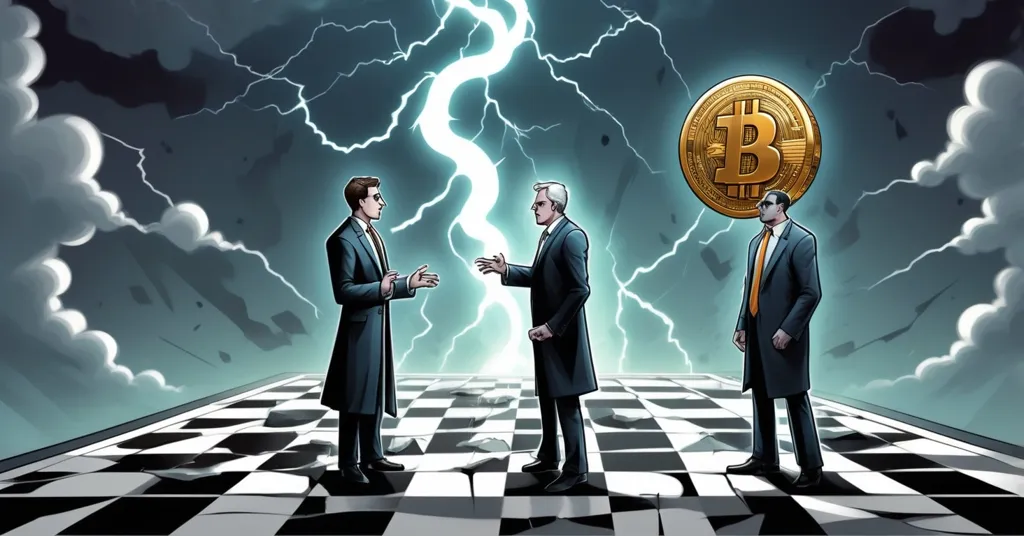Ripple CTO Defends Kraken’s Powell in XRP Bias Row Amid $15B IPO Buzz

Ripple CTO Backs Kraken’s Powell in XRP Bias Clash as $15B IPO Looms
A seemingly offhand social media poll about IPOs has ignited a fiery showdown in the crypto community, with Ripple’s Chief Technology Officer David Schwartz defending Kraken co-founder Jesse Powell against claims of an anti-XRP vendetta. With Kraken reportedly on the cusp of a jaw-dropping $15 billion initial public offering (IPO), its past decision to halt XRP trading for U.S. customers is once again under the spotlight, laying bare the messy tangle of regulatory uncertainty, business survival, and public perception in this turbulent space.
- XRP Spat Erupts: Ripple CTO David Schwartz defends Kraken’s Jesse Powell against accusations of XRP bias after a social media flare-up.
- Regulatory Minefield: Powell’s long-standing caution over XRP’s legal status fueled Kraken’s trading suspension, a business call over personal grudge.
- Kraken’s Mega Plans: Amid a $100 million funding push and $15 billion IPO target, past XRP choices draw renewed heat.
- Industry Tensions: The clash highlights crypto’s ongoing battle with unclear U.S. regulations, stifling progress as exchanges play it safe.
Social Media Sparks an Old Feud Over XRP
The latest uproar began with a casual IPO poll posted by David Schwartz, Ripple’s CTO, on social media. A user jumped in, accusing Jesse Powell, the co-founder of heavyweight crypto exchange Kraken, of nursing a deep hatred for Ripple and its native token, XRP. Schwartz didn’t let it slide.
“Powell’s stance has always been more nuanced,”
he fired back, aiming to dismantle the oversimplified narrative of Powell as an XRP foe as detailed in this recent exchange. This isn’t just a Twitter spat—it’s a window into a years-long tension between innovative tech and the regulatory quicksand threatening to swallow it whole.
For those just dipping their toes into crypto, XRP is a digital currency created by Ripple Labs, a company focused on speeding up and slashing the cost of cross-border payments. Unlike Bitcoin, which runs on a leaderless, decentralized network, XRP’s close association with Ripple Labs—formerly known as OpenCoin—has always stirred controversy. Is it a freewheeling digital asset like Bitcoin, or a security, akin to stocks or bonds, under the iron grip of government oversight? This question fuels a high-stakes lawsuit launched by the U.S. Securities and Exchange Commission (SEC) in December 2020, claiming XRP is an unregistered security. The verdict, still pending, could reshape the regulatory landscape for all cryptocurrencies in the U.S., not just Ripple’s brainchild.
Kraken’s High-Wire Act: Dodging XRP’s Legal Risks
Jesse Powell’s skepticism about XRP isn’t a recent development—it stretches back to the token’s infancy, grounded in the murky legal status tied to its Ripple connection. Powell has repeatedly flagged what he dubs an
“asymmetrical risk”
for platforms like Kraken, as explored in-depth regarding his views on XRP’s legal challenges. Break it down, and it’s a brutal reality: if XRP gets slapped with a “security” label, any exchange trading it could be hit with devastating penalties or lawsuits, even if they operated under the belief it was just another crypto coin. Think of it as betting big on a horse race where the rules might flip midway—you could lose everything, but there’s no extra prize for taking the gamble. That’s the bind Powell’s been wrestling with.
Faced with this uncertainty, Kraken pulled the plug on XRP trading for U.S. customers back in January 2021. Powell didn’t mince words, calling it
“too risky from a business perspective.”
This wasn’t about spitting in Ripple’s face or snubbing the XRP army—it was a calculated move to avoid a regulatory nuke, a decision echoed in community discussions on platforms like Reddit. Kraken’s not an outlier here; heavyweights like Coinbase and Binance.US have also delisted or restricted XRP trading in the U.S. while the SEC case drags on. For XRP supporters, it stings like a betrayal, but for exchanges, it’s less about picking fights and more about not getting obliterated when the legal hammer drops.
Let’s cut the crap: the U.S. regulatory scene for crypto is a goddamn disaster, strangling innovation while jurisdictions like Germany and Switzerland lay out clearer paths that lure projects like Swarm Markets to pack up and move. Powell’s caution makes sense on paper, but are exchanges like Kraken, by benching assets like XRP, slowing the very adoption we’re all rooting for? As advocates of decentralization and effective accelerationism (e/acc), we’re all about pushing boundaries with smart risks, not cowering behind endless “wait and see” cop-outs. That said, Powell’s fear of getting legally screwed isn’t baseless—it’s just a frustrating roadblock in a space where bold vision keeps slamming into harsh reality, a concern shared in broader regulatory debates as seen in analysis of crypto legal ambiguities.
Kraken’s $15 Billion IPO: Why XRP Drama Matters Now
Here’s where the stakes get even higher. This XRP controversy isn’t resurfacing in a vacuum—Kraken is making headlines for moves that dwarf a single token dispute. Reports confirm the exchange is wrapping up a $100 million funding round as a prelude to an IPO that could peg its valuation at over $15 billion, as covered in recent financial updates. Boasting daily trading volumes north of $1.37 billion and supporting more than 1,100 trading pairs, Kraken is a juggernaut in the crypto game. Going public, much like Coinbase’s volatile 2021 debut valued at $86 billion before a rocky ride, would cement its push for mainstream financial cred. But with Wall Street’s eyes on deck, every skeleton in the closet—like the XRP suspension—gets dragged into the harsh light of public scrutiny. Perception is everything when you’re sailing stormy regulatory seas toward a multi-billion-dollar treasure chest.
Kraken’s ambitions don’t stop at trading digital coins. A recent partnership with Backed to roll out tokenized stock trading for non-U.S. customers—think digital slices of Apple, Nvidia, or Tesla shares tradable on blockchain platforms, often bypassing Wall Street’s middlemen—shows it’s diversifying to pad against risks. This isn’t just flashy tech for clout; it’s a buffer against regulatory whiplash on specific assets like XRP. For a platform moving billions daily, every play is a chess move—disrupt where you can, but don’t get checkmated by one bad decision. The XRP call, in this light, is just one piece of a bigger risk-management puzzle, especially when considering the evolving relationship dynamics between Ripple and Kraken under regulatory pressures.
Ripple’s SEC Battle: Partial Wins, Endless War
The heart of the XRP mess lies in Ripple’s ongoing slugfest with the SEC. Since the lawsuit kicked off in 2020, it’s been a slow-motion car crash—everyone’s watching, but no one knows when it’ll end. A partial victory came in July 2023 when a court ruled that XRP sales on public exchanges don’t qualify as securities, a huge win for Ripple and its backers. But hold the champagne—the SEC is appealing, and disputes over Ripple’s institutional sales keep the case alive. Translation: exchanges like Kraken aren’t about to relist XRP for U.S. users anytime soon. This isn’t just Ripple’s headache; it’s a glaring signal of how broken U.S. crypto regulation is, leaving everyone from traders to CEOs guessing what’s legal and what’s a ticket to federal court, a topic of heated debate on platforms like Quora.
Compare this to Bitcoin, the granddaddy of crypto, which largely escapes these security debates thanks to its leaderless, decentralized setup. Bitcoin maximalists might sneer at XRP’s corporate ties, arguing it’s not “pure” crypto, but let’s not pretend Bitcoin’s perfect. XRP’s niche in lightning-fast, dirt-cheap cross-border transfers is something Bitcoin, with its sluggish transactions and pricier fees, doesn’t touch. There’s space for both visions—if only the U.S. would stop writing its rulebook in disappearing ink. Until clarity emerges, assets like XRP stay radioactive for cautious players like Kraken.
Crypto’s Bigger Problem: Regulation vs. Revolution
Stepping back, the Kraken-XRP saga mirrors the broader growing pains of the crypto world. Regulatory ambiguity in the U.S. is a quagmire, trapping tokens like XRP in a no-man’s-land while exchanges, developers, and users are left playing a high-stakes guessing game. Look at smaller platforms or non-U.S. exchanges—some still list XRP, rolling the dice on adoption over liability. Then there’s the DeFi space, where decentralized finance protocols face similar regulatory headaches despite lacking a central figurehead like Ripple Labs. Are we safeguarding users by sidelining contentious assets, or are we letting fear choke the revolution we’re building?
As champions of freedom and disruption, we can’t ignore the flip side. If exchanges overreact—ditching assets at the first whiff of legal trouble—don’t they risk alienating the very community driving this financial upheaval? Imagine you’re a small-time trader: would you touch XRP with this dark cloud overhead, or stick to safer bets like Bitcoin? Yet, Powell’s logic isn’t pure cowardice; it’s a survival instinct in a system where one wrong move could sink a billion-dollar ship. This tension—innovation versus compliance—is crypto’s defining struggle, and it’s nowhere near resolved.
Here’s a devil’s advocate twist: is Schwartz’s defense of Powell purely altruistic, or a slick PR play? With Ripple still in legal limbo, smoothing ties with major exchanges like Kraken could pave the way for future relistings or partnerships once the dust settles. It’s a cynical take, but in a space this cutthroat, no gesture is beyond strategic spin. Either way, Schwartz’s words cut through the usual tribal noise—a rare nod that not every clash is a declaration of war.
What Lies Ahead for Kraken and XRP?
As Kraken charts its path to a blockbuster IPO and Ripple dukes it out with the SEC, this XRP dust-up is a stark reminder of crypto’s tightrope walk between visionary tech and soul-crushing bureaucracy. Will the SEC-Ripple ruling finally deliver a clear verdict in 2024, or limp into another year of appeals and uncertainty? Can Kraken’s IPO soar without old controversies like XRP dragging it down in the court of public opinion? Whether you’re stacking XRP, preaching Bitcoin’s gospel, or just geeking out over blockchain’s potential, this regulatory chess match hits us all. One truth stands: crypto doesn’t wait for approval, and if we’re serious about changing the game, neither should we.
Key Questions and Takeaways on XRP, Kraken, and Crypto’s Future
- What kicked off the latest XRP bias row involving Kraken’s Jesse Powell?
A user’s accusation on Ripple CTO David Schwartz’s social media IPO poll claimed Powell harbored an anti-XRP grudge, prompting Schwartz to defend Powell’s more complex, business-focused stance. - Why has Powell been so guarded about XRP?
Powell cites XRP’s legal uncertainty tied to Ripple Labs, warning that a “security” classification could expose Kraken to massive liability, a risk too steep to ignore. - What action did Kraken take on XRP, and what was the reasoning?
Kraken halted XRP trading for U.S. customers in January 2021, a decision Powell framed as a necessary shield against regulatory fallout, not a personal slight against Ripple. - How does Kraken’s looming IPO relate to this XRP controversy?
With a $100 million funding round and a $15 billion IPO valuation in sight, Kraken’s past XRP suspension is under fresh scrutiny as public and investor perception becomes paramount. - What wider crypto challenges does this situation expose?
It lays bare the U.S.’s crippling regulatory ambiguity, the defensive posture of major exchanges, and the conflict between driving innovation and dodging legal landmines. - Is there more to Schwartz’s defense of Powell than meets the eye?
While likely sincere, it could double as a strategic olive branch from Ripple to Kraken, potentially easing future relistings or collaborations if legal hurdles clear.



